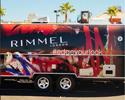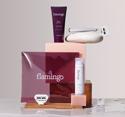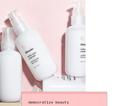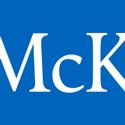Brands
Men's Grooming Brand Oars + Alps Forms Retail Partnership With Ulta Beauty
 Following a US$1.3 million seed-funding round in summer last year, male grooming brand Oars + Alps is partnering with Ulta Beauty to expand distribution beyond its own direct-to-consumer platform. It’s the brand’s first retail partnership, although it sells select items on Amazon’s Luxury Beauty store. Ulta will sell seven of the 23 Oars + Alps products on Ulta.com and in 300 stores. Co-founder and chief executive officer Mia Duchnowski claims the partnership can help boost awareness of the brand's products. The brand competes in category dominated by brands like Procter & Gamble's Gillette and Old Spice, and Unilever’s Axe.[Image Credit: © Oars + Alps]
Following a US$1.3 million seed-funding round in summer last year, male grooming brand Oars + Alps is partnering with Ulta Beauty to expand distribution beyond its own direct-to-consumer platform. It’s the brand’s first retail partnership, although it sells select items on Amazon’s Luxury Beauty store. Ulta will sell seven of the 23 Oars + Alps products on Ulta.com and in 300 stores. Co-founder and chief executive officer Mia Duchnowski claims the partnership can help boost awareness of the brand's products. The brand competes in category dominated by brands like Procter & Gamble's Gillette and Old Spice, and Unilever’s Axe.[Image Credit: © Oars + Alps]
Gillette Introduces Its First Direct-To-Consumer Service In Canada
True Sons Launches Subscription Model To Tap Home Hair Dye Market For Men
 Seeing the lack of choices for men who want to color their head, beard and body hair at home, True Sons launched an at-home hair dye subscription service. Founder Carl Sandler, claims current offerings are very limited with the brand Just for Men dominating the $200 million market. He believes men find shopping for the product difficult and embarrassing and would prefer to have it delivered. Currently, just 8 percent of men color their hair compared to 80 percent of women. The kit includes all elements needed - gloves, wipes and the ready-mixed hair dye foam. It’s available from the brand's website, truesons.com, for $30 per month or $72 per quarter.[Image Credit: © https://truesons.com/]
Seeing the lack of choices for men who want to color their head, beard and body hair at home, True Sons launched an at-home hair dye subscription service. Founder Carl Sandler, claims current offerings are very limited with the brand Just for Men dominating the $200 million market. He believes men find shopping for the product difficult and embarrassing and would prefer to have it delivered. Currently, just 8 percent of men color their hair compared to 80 percent of women. The kit includes all elements needed - gloves, wipes and the ready-mixed hair dye foam. It’s available from the brand's website, truesons.com, for $30 per month or $72 per quarter.[Image Credit: © https://truesons.com/]
Two Brands Are Using Face-To-Face Contact With Consumers To Promote Their Products
 At the end of October, Nivea opened a pop-up store in London for the launch of the MicellAIR Professional cleansing line. The ‘Boo-tique’ has a Halloween theme and offers five looks by the brand’s professional make-up artists. Visitors can take away a free bag of products from the new range. In the US, Rimmel London is getting on the road during October and November with its (Street) Art of Beauty tour. Customers can visit the exclusive mobile salon, which is covered by graffiti created by the brand. The salon has makeup artists to help visitors choose Rimmel’s products. The tour goes to Los Angeles, Las Vegas, Phoenix, Dallas, Houston, Tampa and Miami.[Image Credit: © Coty Inc.]
At the end of October, Nivea opened a pop-up store in London for the launch of the MicellAIR Professional cleansing line. The ‘Boo-tique’ has a Halloween theme and offers five looks by the brand’s professional make-up artists. Visitors can take away a free bag of products from the new range. In the US, Rimmel London is getting on the road during October and November with its (Street) Art of Beauty tour. Customers can visit the exclusive mobile salon, which is covered by graffiti created by the brand. The salon has makeup artists to help visitors choose Rimmel’s products. The tour goes to Los Angeles, Las Vegas, Phoenix, Dallas, Houston, Tampa and Miami.[Image Credit: © Coty Inc.]
Companies
Johnson & Johnson And VaynerMedia Focus On Credibility To Sway Gen Z
 Brands are responding to a decline in consumer trust of influencers. Johnson & Johnson and its creative agency, VaynerMedia, are reaching out to Gen Z consumers by enlisting teenagers who, by their actions, are seen as more credible, through their actions, even if they have a more modest online following. The company selected several teenagers, including Dillon Eisman who runs a nonprofit in Southern California, to star in one of its videos promoting the skincare brand Clean & Clear, resulting in a 19 percent boost in sales. Credibility was also a key factor in turning to established major influencers Brooklyn and Bailey McKnight to launch C&C, a new Clean & Clear sub-brand. [Image Credit: © J&JCI]
Brands are responding to a decline in consumer trust of influencers. Johnson & Johnson and its creative agency, VaynerMedia, are reaching out to Gen Z consumers by enlisting teenagers who, by their actions, are seen as more credible, through their actions, even if they have a more modest online following. The company selected several teenagers, including Dillon Eisman who runs a nonprofit in Southern California, to star in one of its videos promoting the skincare brand Clean & Clear, resulting in a 19 percent boost in sales. Credibility was also a key factor in turning to established major influencers Brooklyn and Bailey McKnight to launch C&C, a new Clean & Clear sub-brand. [Image Credit: © J&JCI]
Direct-To-Consumer Retailer Brandless Opens Second Pop-Up With Purpose Store In New York City
 Brandless, a direct-to-consumer e-commerce business focusing on affordable pricing, opened its second Pop-Up With Purpose store in New York's Milk Building. It will run from late October to early November 2018, offering visitors an interactive experiences, including a beauty lounge and fair trade coffee bar. Chief executive officer and co-founder Tina Sharkey says the company wants to highlight values of the company and those of its online community, using multimedia displays. Brandless also wants the pop-up to widen its reach to young urban consumers.[Image Credit: © Brandless, Inc.]
Brandless, a direct-to-consumer e-commerce business focusing on affordable pricing, opened its second Pop-Up With Purpose store in New York's Milk Building. It will run from late October to early November 2018, offering visitors an interactive experiences, including a beauty lounge and fair trade coffee bar. Chief executive officer and co-founder Tina Sharkey says the company wants to highlight values of the company and those of its online community, using multimedia displays. Brandless also wants the pop-up to widen its reach to young urban consumers.[Image Credit: © Brandless, Inc.]
Survey Shows Convenience A Key Reason For The Growing Popularity of Direct-To-Consumer Brands
 A survey by Diffusion and YouGov discovered several reasons for the growing popularity of DTC brands among consumers, with convenience being the primary motivation. 27% said buying DTC brands is more convenient than going to a store, with older consumers finding convenience more important than millennials (26% versus 17%). The survey found that DTC brands fell short with personalization, customer service, and limited use of organic or eco-friendly ingredients. Still, DTC looks set for continued growth, with 81% of US internet users indicating they’d buy at least one DTC item in the next five years.[Image Credit: © YouGov PLC.]
A survey by Diffusion and YouGov discovered several reasons for the growing popularity of DTC brands among consumers, with convenience being the primary motivation. 27% said buying DTC brands is more convenient than going to a store, with older consumers finding convenience more important than millennials (26% versus 17%). The survey found that DTC brands fell short with personalization, customer service, and limited use of organic or eco-friendly ingredients. Still, DTC looks set for continued growth, with 81% of US internet users indicating they’d buy at least one DTC item in the next five years.[Image Credit: © YouGov PLC.]
Big Data And AI Helping Beauty Brands Identify Opportunities, Develop New Products
 AI is being used to help companies spot unserved opportunities through analyzing online data such as searches, reviews and purchase patterns. Alibaba’s Tmall Innovation Centre helped L'Oréal China as it developed a male beauty line for the Chinese market, while A.S. Watson, which has 14,400 stores in 24 markets worldwide worked with Unilever to launch TRESemmé hair care in China Some smaller brands are using AI to developed personalized products and services. Indian brand, Freewill, uses information about an individual’s hair to create personalized hair products, factoring in data such as city and weather. While Singapore-based Alcheme uses AI to analyze a customer’s selfie to assess skin conditions and select and create personalized skin care products.[Image Credit: © Tmall.com]
AI is being used to help companies spot unserved opportunities through analyzing online data such as searches, reviews and purchase patterns. Alibaba’s Tmall Innovation Centre helped L'Oréal China as it developed a male beauty line for the Chinese market, while A.S. Watson, which has 14,400 stores in 24 markets worldwide worked with Unilever to launch TRESemmé hair care in China Some smaller brands are using AI to developed personalized products and services. Indian brand, Freewill, uses information about an individual’s hair to create personalized hair products, factoring in data such as city and weather. While Singapore-based Alcheme uses AI to analyze a customer’s selfie to assess skin conditions and select and create personalized skin care products.[Image Credit: © Tmall.com]
Chanel South Korea Launches Online Platform For Cosmetics
 In South Korea, Chanel launched an online platform for its cosmetic products and service with a wrapping service and select deliver day option to encourage gifting. Separately, and in an attempt to attract young customers, particularly those in their 20s and 30s, Chanel Korea launched a Coco Game Center pop-up store which features game that feature the Chanel logo.[Image Credit: © Chanel, Inc.]
In South Korea, Chanel launched an online platform for its cosmetic products and service with a wrapping service and select deliver day option to encourage gifting. Separately, and in an attempt to attract young customers, particularly those in their 20s and 30s, Chanel Korea launched a Coco Game Center pop-up store which features game that feature the Chanel logo.[Image Credit: © Chanel, Inc.]
Avon South Africa Launches Its First Beauty Pop-Up Store

In an attempt to increase accessibility [to?] and awareness of its brand, Avon South Africa opened the first of a series of exclusive beauty pop-up stores. The stores will be at major cities and will have make-up specialists and skincare experts to advise customers. Precilla Kalogeropoulos, head of integrated marketing communications at Avon, claims more pop-up stores will be launched nationwide to promote the Avon brand, and especially its premium lines, but also to encourage women to become entrepreneurs as an Avon representative. [Image Credit: © Avon Products]
Shopify Opens Its First Physical Store In Los Angeles
 Shopify has opened its first retail store in Los Angeles where it plans to showcase its hardware products and services. The retail store, which resembles an Apple store, will provide Shopify customers the opportunity to learn how they can use the company's payment and supply management solutions to grow their businesses. Chief operating officer, Harley Finkelstein, claims the retail store will also serve as a community for entrepreneurs to help them advance their entrepreneurial aspirations.[Image Credit: © Business Wire, Inc.]
Shopify has opened its first retail store in Los Angeles where it plans to showcase its hardware products and services. The retail store, which resembles an Apple store, will provide Shopify customers the opportunity to learn how they can use the company's payment and supply management solutions to grow their businesses. Chief operating officer, Harley Finkelstein, claims the retail store will also serve as a community for entrepreneurs to help them advance their entrepreneurial aspirations.[Image Credit: © Business Wire, Inc.]
Travel Product Retailer Ben Lido Launches Subscription-Based, Customizable Travel Kits
 In a bid to help transform the way travelers prepare for a trip, Ben Lido launched subscription-based, customizable travel kits. The travel kits contain personal care products for different types of travelers, such as business travelers, frequent flyers, and leisure travelers. Chief executive officer, Drew Rayman, claims his company stands apart because of its focus on providing convenience. The company has partnered with a number of top brands, including Dove, Colgate, Tom's of Maine and Schmidt's Naturals. Prices for the kits range from 30.00 dollars to 135.00 dollars.[Image Credit: © Ben Lido]
In a bid to help transform the way travelers prepare for a trip, Ben Lido launched subscription-based, customizable travel kits. The travel kits contain personal care products for different types of travelers, such as business travelers, frequent flyers, and leisure travelers. Chief executive officer, Drew Rayman, claims his company stands apart because of its focus on providing convenience. The company has partnered with a number of top brands, including Dove, Colgate, Tom's of Maine and Schmidt's Naturals. Prices for the kits range from 30.00 dollars to 135.00 dollars.[Image Credit: © Ben Lido]
Stores Offer Subscription Services And Recurring Shipments To Attract And Create Loyal Male Customers

Several DTC stores targeted at men have developed subscription and recurring delivery services that allow them to customize and update their preferences. True Sons, which delivers at-home hair dyeing products, lets users set delivery frequency, MeUndies, a $16 per month subscription plan for underwear, allows customers to skip a month whenever they want, and Frank & Oak’s monthly clothing subscription service, Style Plan, allows consumers to return free of charge all selected products for a ‘styling fee’.[Image Credit: © MODASUITE Inc.]
L’Oréal Promotes Anca Stefan To Chief Digital Officer For Russia And Kazakhstan
Harry’s Launches New Subscription Shaving Brand For Women

Flamingo is a new shaving subscription service launched by Harry’s, developed by its internal innovation unit, Harry’s Labs, and aimed at women. Leading the brand are Allie Melnick and Brittania Boey, who were both at Harry’s when it launched in 2013. It will compete with brands including Angel Shave Club. Flamingo razors use the same blade technology as Harry’s, but are designed with female shaving needs in mind. The shaving gel is a formulation designed to soothe the skin. Other items under the brand include a dual exfoliating and moisturizing body lotion, and waxing kits for body and face.[Image Credit: © Harry's, Inc.]
Gillette Launches Customizable 3D-Printed Razors
 Gillette has launched a new personalized platform for shaving in the US, called Dubbed Razor Maker™: powered by Gillette®. It is based on technology from Formlabs, a 3D-printing company, and offers customizable handles providing customers with flexibility over how the product looks and how much it costs. They can design their 3D-printed handle at http://razor-maker.com, selecting from 48 designs, seven colors. They can also add text. The handles can hold MACH3 or Fusion5 ProGlide blades. Delivery typically takes in 2-3 weeks, and prices start at $19. Chrome options can cost up to $45.[Image Credit: © Procter & Gamble]
Gillette has launched a new personalized platform for shaving in the US, called Dubbed Razor Maker™: powered by Gillette®. It is based on technology from Formlabs, a 3D-printing company, and offers customizable handles providing customers with flexibility over how the product looks and how much it costs. They can design their 3D-printed handle at http://razor-maker.com, selecting from 48 designs, seven colors. They can also add text. The handles can hold MACH3 or Fusion5 ProGlide blades. Delivery typically takes in 2-3 weeks, and prices start at $19. Chrome options can cost up to $45.[Image Credit: © Procter & Gamble]
Scentbird Is Using New Funding To Expand Its Reach
 Scentbird is an online direct-to-consumer business that offers subscribers a choice from 500 designer fragrances, narrowed down after the customer completes a questionnaire. For $14.95 per month, the customer receives a 30-day supply of the scent (120 sprays). According to one of its founders, its success, which has led to nearly $19 million of Series A funding this year, is timing when to pitch for funding. Having a clear vision is also essential. With more funding, the brand is looking to expand its list of fragrances and private label options. It introduced its own lip balms and hand creams last year, but plans to launch “limited-time beauty capsule collections”. The first is Lush Gold - a body wash, lip oil and body oil bundle. The luxury comes from its 24-karat gold flakes. The bundle will be available to subscribers at $14.95, but will cost more for a one-off purchase.[Image Credit: © SCENTBIRD]
Scentbird is an online direct-to-consumer business that offers subscribers a choice from 500 designer fragrances, narrowed down after the customer completes a questionnaire. For $14.95 per month, the customer receives a 30-day supply of the scent (120 sprays). According to one of its founders, its success, which has led to nearly $19 million of Series A funding this year, is timing when to pitch for funding. Having a clear vision is also essential. With more funding, the brand is looking to expand its list of fragrances and private label options. It introduced its own lip balms and hand creams last year, but plans to launch “limited-time beauty capsule collections”. The first is Lush Gold - a body wash, lip oil and body oil bundle. The luxury comes from its 24-karat gold flakes. The bundle will be available to subscribers at $14.95, but will cost more for a one-off purchase.[Image Credit: © SCENTBIRD]
Glossier Ads France To Its Geographic Reach

Glossier continues to expand internationally, adding France to the US, UK and Canada after first partnering with Colette, a French brand. Glossier’s founder, Emily Weiss, described the response from consumers in France as “incredible”. Weiss said the brand will soon launch in more markets globally, working only with companies that don’t conform to its cruelty-free policy.[Image Credit: © Glossier Inc. ]
Brand Sites Are Losing Out To Multi-Brand Giants
 New research finds that only around 10% of online shoppers are visiting brand sites, which are losing out to sites like Amazon. inRiver’s survey also found that consumers lose interest quickly and will move on if they can’t quickly find the information they want. The firm said that brands and retailers must take more care when selling online and consider issues such as the role of influencers and videos that showcase products, as well as providing comprehensive product information and reviews.[Image Credit: © inRiver]
New research finds that only around 10% of online shoppers are visiting brand sites, which are losing out to sites like Amazon. inRiver’s survey also found that consumers lose interest quickly and will move on if they can’t quickly find the information they want. The firm said that brands and retailers must take more care when selling online and consider issues such as the role of influencers and videos that showcase products, as well as providing comprehensive product information and reviews.[Image Credit: © inRiver]
J&J Acquires Japan’s Ci:z Holdings And Its Skincare And Dermocosmetic Brands
 Johnson & Johnson has announced an agreement to acquire all outstanding shares it doesn’t already own in Ci:z Holdings Co., Ltd., a Japanese skincare and dermocosmetic company, for some ¥230 billion (about US$2 billion). The deal includes brands like Genomer, Dr.Ci:Labo and Labo Labo. One of the benefits cited by J&J is improving its online commerce capabilities by “leveraging one of the largest customer relationship management databases for direct-to-consumer skincare in Japan”. The offer is expected to close early next year.[Image Credit: © Ci:z Holdings]
Johnson & Johnson has announced an agreement to acquire all outstanding shares it doesn’t already own in Ci:z Holdings Co., Ltd., a Japanese skincare and dermocosmetic company, for some ¥230 billion (about US$2 billion). The deal includes brands like Genomer, Dr.Ci:Labo and Labo Labo. One of the benefits cited by J&J is improving its online commerce capabilities by “leveraging one of the largest customer relationship management databases for direct-to-consumer skincare in Japan”. The offer is expected to close early next year.[Image Credit: © Ci:z Holdings]
Startup Tampon Brands Are Bringing New Ideas To The Category
 Established tampon makers are finding emerging competition from brands with organic and natural claims. Cora is a direct-to-consumer brand launched three years ago and offers organic tampons. Like Lola, another new competitor, it allows customers to personalize monthly shipments by mixing products and sizes. Cora has moved away from its exclusively online model by partnering with Target, and donates a share of its profits to provide menstruation products to girls in India and Kenya. Lola has extended to sex-related items, including condoms and lubricants. Flex is a brand set up to find a tampon-alternative and came up with a “period disk that sits past the vaginal canal (where tampons sit) next to the cervix”. Flex too sells direct-to-consumer platform and in retail stores. The founder says 90% of its online sales are from mobile purchases by millennials.[Image Credit: © CORA]
Established tampon makers are finding emerging competition from brands with organic and natural claims. Cora is a direct-to-consumer brand launched three years ago and offers organic tampons. Like Lola, another new competitor, it allows customers to personalize monthly shipments by mixing products and sizes. Cora has moved away from its exclusively online model by partnering with Target, and donates a share of its profits to provide menstruation products to girls in India and Kenya. Lola has extended to sex-related items, including condoms and lubricants. Flex is a brand set up to find a tampon-alternative and came up with a “period disk that sits past the vaginal canal (where tampons sit) next to the cervix”. Flex too sells direct-to-consumer platform and in retail stores. The founder says 90% of its online sales are from mobile purchases by millennials.[Image Credit: © CORA]
Consumers
Subscription Models Are Becoming Ubiquitous For COG E-Commerce
 McKinsey found e-commerce sales through subscriptions were over $2.6 billion in 2016, up from $57.0 million in 2011. They are being used by startups and established brands as well as large pure-play etailers and bricks-and-clicks, and large CPGs have been acquiring subscription commerce companies. According to McKinsey, there are three main subscription types: auto-replenishment; curation and recommendations; and access through some form of members-only platform. Reasons for canceling accounts depended partly on the type of service. For auto-replenishment, quality and lack of flexibility were seen as issues, but poor value was a common reason for terminating curated or members-only accounts. Sampling prestige products is seen as an attractive feature of beauty box subscription services, but this approach isn’t possible for all categories.[Image Credit: © McKinsey & Company]
McKinsey found e-commerce sales through subscriptions were over $2.6 billion in 2016, up from $57.0 million in 2011. They are being used by startups and established brands as well as large pure-play etailers and bricks-and-clicks, and large CPGs have been acquiring subscription commerce companies. According to McKinsey, there are three main subscription types: auto-replenishment; curation and recommendations; and access through some form of members-only platform. Reasons for canceling accounts depended partly on the type of service. For auto-replenishment, quality and lack of flexibility were seen as issues, but poor value was a common reason for terminating curated or members-only accounts. Sampling prestige products is seen as an attractive feature of beauty box subscription services, but this approach isn’t possible for all categories.[Image Credit: © McKinsey & Company]
Copyright 2026 Business360, Inc.

